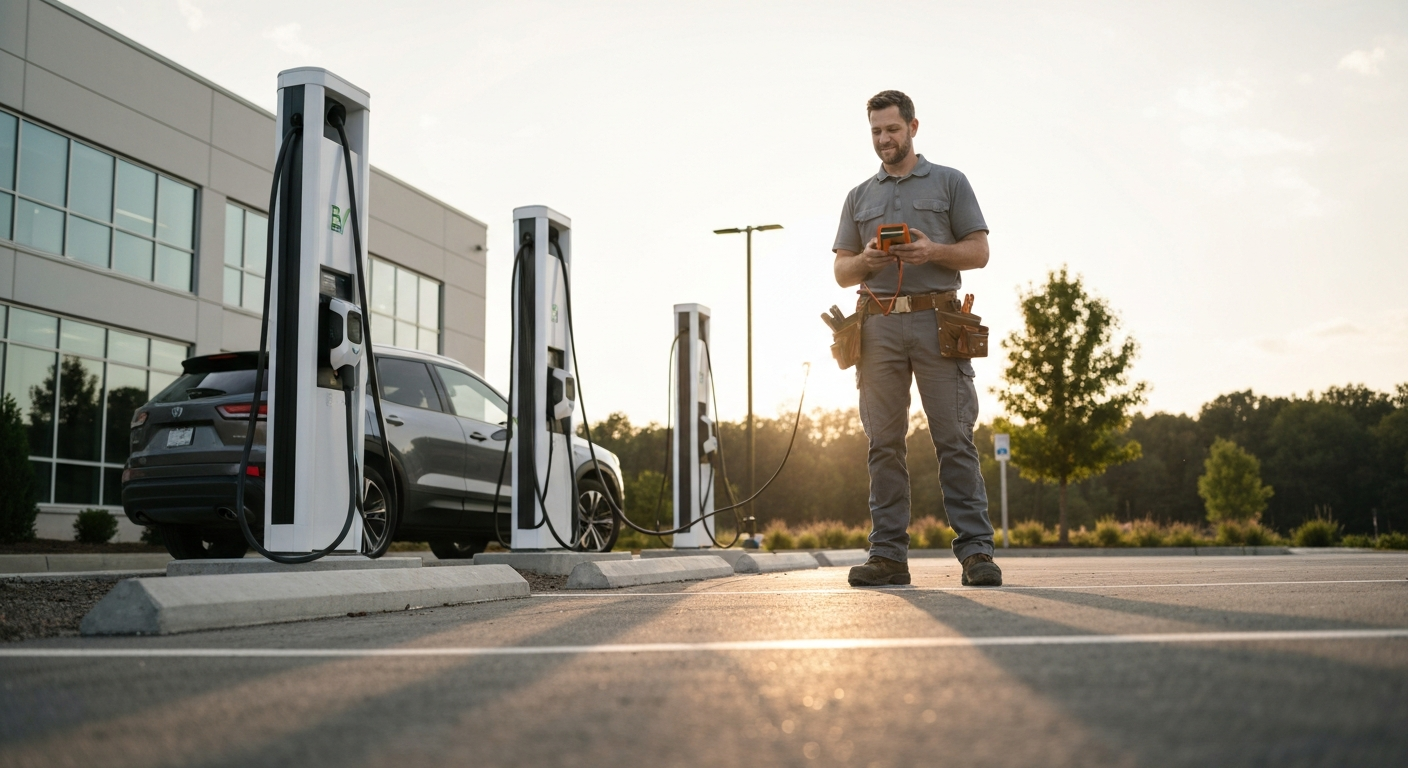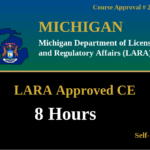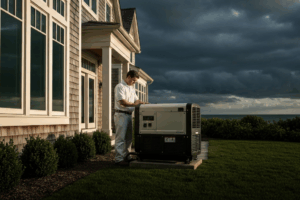
EV Charging Station Growth in Michigan: A Guide for Electricians
The Unprecedented Scale of Michigan’s EV Market Boom
Let’s put that 100,000-charger goal into perspective. As of early 2024, Michigan had just over 1,450 public Level 2 and DC fast charging stations combined. To meet the 2030 target, industry projections estimate the state needs to add approximately 90,000 Level 2 chargers and 10,000 DC fast chargers. This massive infrastructure build-out, funded by nearly $110 million in National Electric Vehicle Infrastructure (NEVI) funds and significant private investment, translates directly into tens of thousands of projects for skilled electricians. This surge creates a high demand for both residential electrician specialists and contractors capable of handling large commercial EV projects.
Residential EV Charger Installation: Your Bread and Butter
For every EV sold, a charging solution is needed, and for most owners, that means a home installation. This is the steady, reliable work that will form the foundation of the EV boom for many electricians. Homeowners will need a dedicated 240-volt circuit installation to power their new equipment. The conversation often involves a choice: a simple NEMA 14-50 outlet for a plug-in charger or a hardwired EVSE (Electric Vehicle Supply Equipment) for a permanent, weatherproof setup.
The most critical skill in this area is performing an accurate EV load calculation. Many older Michigan homes have 100-amp or 150-amp services that may not safely accommodate the continuous load of a Level 2 charger. This frequently leads to a necessary electrical service upgrade for EV charging, a more complex and profitable job. Understanding how the 2023 NEC affects these calculations is crucial for accurate bidding and safe installations. For a deeper dive, it’s essential to know how to calculate EVSE load requirements per NEC 2023.
Expanding to Commercial: Bigger Projects, Bigger Paychecks
While residential work provides volume, commercial EV charger installation offers larger, more complex projects. Michigan is aggressively expanding its public charging network, with a 52% increase in DC fast charger Michigan ports in 2023 alone. These projects are popping up at offices, multi-family housing complexes, retail centers, and highway corridors.
These installations are a significant step up from residential jobs, often involving extensive EVSE wiring and conduit runs, switchgear integration, and meticulous planning. Using a voltage drop calculator becomes non-negotiable to ensure proper performance over long distances. To stand out and qualify for these high-value projects, consider obtaining your EVITP certification Michigan. The Electric Vehicle Infrastructure Training Program is increasingly recognized by utilities and project managers as the gold standard for EVSE installation professionals.
Code, Compliance, and Permits: Your Technical Edge
Profitably and safely navigating the EV charging station Michigan market requires a firm grasp of the rules. The Michigan electrical code EV requirements are built upon NEC Article 625, which governs everything from circuit protection and wiring methods to load management systems. The 2023 edition of the NEC brought significant updates that every electrician in this space must know.
Understanding these changes is key to efficiency and compliance. For instance, the new code clarifies how 2023 NEC rules are changing EV charger installation requirements, making some aspects more straightforward while adding new considerations. It also impacts one of the most critical parts of the job: load management. Staying current on how 2023 NEC changes affect EVSE load calculations and adjustable settings is essential for designing safe, reliable systems. Additionally, the code has evolved to simplify electric vehicle branch circuit requirements under certain conditions. Finally, remember that each installation will require a Michigan EV charger permit from the local authority having jurisdiction (AHJ), so be sure to factor that process into your project timelines.
Leverage Utility Programs to Win More Bids
One of the best tools for winning jobs is helping your customers save money. Major utilities in the state, including the DTE Energy EV charger program and Consumers Energy PowerMIDrive program, offer substantial rebates and incentives for both residential and commercial installations. These programs can cover a significant portion of the cost for a Level 2 charger installation and even help fund a necessary service upgrade. By familiarizing yourself with these programs, you can present a much more attractive proposal to potential clients, positioning yourself not just as an installer, but as a knowledgeable partner who can maximize their savings.
Conclusion: Are You Ready for the EV Boom?
The transition to electric vehicles is creating a once-in-a-generation opportunity for Michigan’s electricians. From straightforward residential installs to complex commercial DC fast-charging hubs, the demand for skilled, knowledgeable professionals is set to explode. By mastering the nuances of EV load calculation, understanding the specifics of NEC Article 625, and leveraging state and utility incentives, you can move from being just another bidder to a go-to expert in this lucrative field. Position yourself as a leader in this growing industry. To stay ahead of the curve and master the latest code requirements, browse our courses today to ensure you’re ready for the charge.
Frequently Asked Questions
- Do I need a special certification to install EV chargers in Michigan?
While Michigan doesn’t have a unique state-mandated license just for EV chargers, obtaining an EVITP certification Michigan is highly recommended. It is often a prerequisite for participating in utility rebate programs and bidding on larger commercial EV charger installation projects. - What’s more common for a residential installation: a hardwired charger or a NEMA 14-50 outlet?
Both are common, but the choice depends on the homeowner’s needs. A NEMA 14-50 outlet offers flexibility to use a portable charger, while a hardwired unit typically allows for higher power delivery, is more durable, and is better suited for outdoor installations. - Why is an accurate EV load calculation so important?
An EV charger is a heavy, continuous load. A faulty calculation can lead to overloaded panels, nuisance tripping, and a potential fire hazard. It’s also the key to determining if a home needs an electrical service upgrade for EV readiness, which is a critical safety and performance issue.
Michigan Continuing Education Courses
Explore our board-approved continuing education courses for Michigan professionals:
View CE RequirementsMichigan – 15 hours NEC 2023 Code Changes Update
Michigan – 8 hours NEC 2023 Changes for Sign Specialist
Disclaimer: The information provided in this educational content has been prepared with care to reflect current regulatory requirements for continuing education. However, licensing rules and regulations can vary by state and are subject to change. While we strive for accuracy, ExpertCE cannot guarantee that all details are complete or up to date at the time of reading. For the most current and authoritative information, always refer directly to your state’s official licensing board or regulatory agency.





